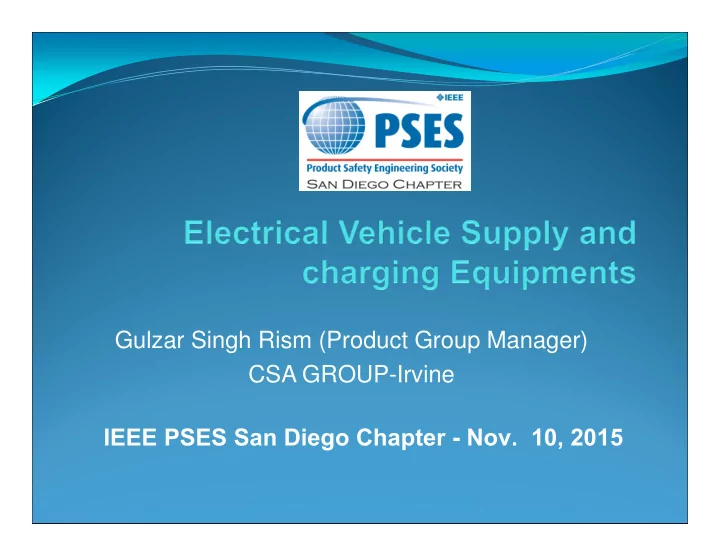

Gulzar Singh Rism (Product Group Manager) CSA GROUP-Irvine IEEE PSES San Diego Chapter - Nov. 10, 2015
Outline � General � CEC/NEC � END product Standards � Related Component standards � Harmonization � Overview of Product Standards
General Electric Vehicle Charger Levels (Industry Terms) � Level-I : AC in AC out, Rated 120Vac 16A max, can be portable, stationary or movable. Full charge takes many hours. Typically a portable cord set is kept or provided in the electric car. � Level-II : AC in AC out, Above the power levels of I, can be stationary, movable or permanent. Full charge takes few hours. Typical stationary equipment in your home garage or a pedestals/boxes installed in a city/region. � DC fast Charger: AC in DC out, mostly permanent connected, similar to a service station. Full charge approx. in less than an hour.
Level 1 – Cord Set 4
Level 1 Charge points 5
Level 2 6
DC Fast Charger 7
CEC/NEC Section 86 of CEC Part-I and Article 625 of NEC � When installed in Commercial Garages or Hazardous location (premises with flammable liquid, gas dispensing and similar facilities), additional requirements (HAZLOC) apply . � Installation can be Indoor or Outdoor. � Shall be located not less than 450 mm and not more than 1.2 m above the floor level (NEC)
End Product Standards Canada: � Standard for Electric Vehicle Supply Equipment : CSA C22.2 No. 280-13. � * General Use Power supplies: CSA C22.2 No. 107.1-01 US: � Electric Vehicle Supply Equipment UL 2594 � * Standard for Electric Vehicle (EV) Charging System Equipment UL 2202. * Not Harmonized
Related Component standards � Canada: � Electric vehicle supply equipment - First Edition CSA C22.2 No 280-13 � Standard for Safety for Personnel Protection Systems for Electric Vehicle (EV) Supply Circuits: General Requirements - First Edition CSA C22.2 No 281.1-12 � Standard for Safety for Personnel Protection Systems for Electric Vehicle (EV) Supply Circuits: Particular Requirements for Protection Devices for Use in Charging Systems - First Edition CSA C22.2 No 281.2-12 � Plugs, receptacles, and couplers for electric vehicles - First Edition CSA C22.2 No 282-13 � Etc
Related Component standards � US : � Standard for Safety Electric Vehicle Supply Equipment - First Edition UL 2594 � Standard for Safety Personnel Protection Systems for Electric Vehicle (EV) Supply Circuits: General Requirements - Second Edition UL 2231- 1 � Standard for Safety Personnel Protection Systems for Electric Vehicle (EV) Supply Circuits: Particular Requirements for Protection Devices for Use in Charging Systems - Second Edition UL 2231-2 � Standard for Safety Plugs, Receptacles, and Couplers for Electric Vehicles - Third Edition UL 2251 � Etc All corresponding standards are Harmonized (including Mexico):
North American Harmonization – EVSE
End Product Standards: UL 2594 and CSA C22.2 No 280 Products covered are: � Supply equipments providing AC power to On-Board Chargers. � Conductive Charging supply equipments. � Portable, Stationary, Movable and Permanent connected � Indoor and Outdoor equipments. Annex A provides reference to all applicable normative standards. Annex B provides details of applicable test based on cord set type, intended use Annex C provides marking/similar language translation. .
End Product Standards: UL 2594 and CSA C22.2 No 280 Contd � Similar construction requirements like, fire enclosure, mechanical enclosure, spacings, accessible part limits, etc. � Additional construction requirements like EV bonding or Personal Protective System (Interruptive device). � Similar test requirements like, leakage current, input test, Temp test, Cap Discharge, Dielectric test, Abnormals, Transformer test (Flanged Bobbin), Strain relief, Cable secureness, Grounding, Impact, Drop, NEMA tests, � Additional tests like: Vibration test (portable cord set) Vehicle drive over test, harmonic distortion test, Electronic Protection circuits, Cord Reels, etc.
End Product Standard: CSA C22.2 No 107.1 � Clause 2 to 6 are general requirements (old 107 standard). � TIL I-44 was issued to cover off-board charger, later was added as Clause 17 to the standard
End Product Standard: UL 2202 Applies to: � Charging system with AC in and DC out, requires a special connector and provided DC to batteries/system. � Conductive and inductive charging systems. � On-board (Supplement SA1-SA84) and Off-Board (Section 2-84) chargers. � Indoor (Section 2-80) and outdoor (Section 2-84) equipments.
End Product Standard: UL 2202 Contd � Similar construction requirements like, fire enclosure, mechanical enclosure, spacings, accessible part limits, etc. � Additional construction requirements like EV bonding, Output power circuits to be RI/DI for inductive chargers. � Similar test requirements like, leakage current, input test, Temp test, Dielectric test, Abnormals, Transformer test (Flanged Bobbin), Strain relief, Stability, Flexing, Bus Bar, Static Load, Handles, Grounding, Cord Tag, Impact, Drop, outdoor test, Etc � Additional tests like: Vibration test, Heat Sink Temp Cycling, harmonic distortion test, etc.
Similarities � A majority of the requirements in UL 2202 and 2594 are identical. � These common requirements are also very similar to those of UL 1012 Power units other than Class 2.
THANK YOU!!! QUESTIONS?
Recommend
More recommend